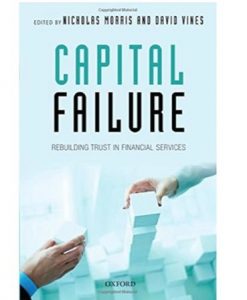David Vines and Nicholas Morris on Capital Failure
 An interview with Oxford Professors David Vines and Nicholas Morris on Capital Failure: Rebuilding Trust in Financial Services. The authors speak with Seven Pillars Institute about their views on ethics, trust, regulation and the way forward in financial services.
An interview with Oxford Professors David Vines and Nicholas Morris on Capital Failure: Rebuilding Trust in Financial Services. The authors speak with Seven Pillars Institute about their views on ethics, trust, regulation and the way forward in financial services.
Your new book Capital Failure: Rebuilding Trust in Financial Services argues the culture of trust in the financial services industry was eroded over the past few decades. Can you give the main reasons for this erosion?
Chapter 2 of our book provides a historical narrative about the many things that happened. The ‘big bang’ deregulation initiated in the Thatcher/Reagan period led to a much more permissive and international trading environment. The industry consolidated into large universal banks, and commoditised the services which these banks provided. Financial gain has come to prevail and the interests of clients have become relevant only to the extent that they further the financial performance of those who provide products for such clients. Regulators believed that efficient markets, guided by Adam Smith’s invisible hand, would automatically lead to good outcomes and so were ‘light handed’. Fiduciary duties were set aside in favour of poorly understood contracts. Securitisation and the rapid growth of derivatives led to larger and larger risks being taken, with other people’s money. Limited liability meant that key players had very limited ‘skin in the game’. Sales and trading culture took over from relationships in the major institutions, which increasingly ceased to care about their reputations. Remuneration systems encouraged the creation of products with excessive ‘tail risk’. Increasing focus on shareholder value maximization has led to adverse outcomes, both for firms and for the economy as a whole.
Why is trust important in financial services industry?
Trust is crucial because we rely on financial services for our long term security, in matters such as pensions and investments, and for the effective working of our economies. Most financial contracts are ‘incomplete’: it is impossible to legislate for all eventualities, and even sophisticated regulation is easily arbitrated around by clever people. Financial products are often (deliberately) complex, and those with greater knowledge or information can easily take advantage of the less well-informed. All of this means we need our advisers and bankers to behave in a professional manner and not to take advantage of the privileged position they enjoy, as for example we expect of our doctors. We need to be able to trust them.
How do we restore trustworthiness in financial services?
In the final chapter of our book we set out a four-part framework for how to restore trustworthiness. This covers the appropriate definition of obligations, the identification of corresponding responsibilities, the creation of mechanisms by which these responsibilities can be carried out, and the holding to account of those involved, in an appropriate manner. In our current research, we are exploring how this framework may be applied to different areas of financial services.
How do we implement these measures?
We do not believe that more complicated administrative regulation aimed at enforcing compliance will work, although better regulation clearly has a role to play. Rather, we believe that measures need to be taken to encourage strong, rather than weak, trustworthiness. (Strong trustworthiness emerges from what Adam Smith described as ‘other regarding behaviour’, while weak is based only on self-interest). Those who provide financial services need to be encouraged to have some regard for how their behaviour affects the clients and customers they serve. Our book contains several chapters that explore different aspects of how to do this, ranging from improvements to regulation, to the introduction of ‘intelligent accountability’, to the strengthening of and expansion of fiduciary duties, and to the development of systematic training and awareness programmes. We also explore what can be learned from other industries that exhibit greater professionalism and customer care.
Do you think we should return to a Glass-Steagall like separation of commercial and investment banking?
Yes. We fear that even robust accounting ring-fencing such as that suggested by the Independent Commission on Banking may not be enough, because culture transcends boundaries. If those with a sales or trading focus, who do not care about the welfare of their customers or are in the same organisations as those who would normally develop good relationships and client care, then their attitudes will reduce the trustworthiness of others, especially if their potential remuneration is greater,
Is regulation not sufficient to change behavior in financial services?
No, it is not. Even in an ideal world with clever and well informed regulators, the industry will find ways round the regulations. In practice, regulators tend to be under-resourced and to have less information than those they seek to regulate. Many are beholden to the industry, and some have aspirations for a better remunerated career when they finish being regulators. Our political systems also do not empower regulators sufficiently for them to take the drastic actions needed, and few legal cases come to sufficient fruition, to provide an effective deterrent. Administrative ‘box-ticking’ rarely gets to the heart of what is wrong, while a compliance culture can often miss fundamental problems.
What do you think of Dutch bankers having to take an oath to act ethically? Will such symbolic acts do much in terms of improving trustworthiness in financial services?
Bringing the type of behaviour that is expected to the attention of bankers is a good first step, and the Dutch are to be congratulated on introducing this. Doctors (at least in the UK) do more-or-less behave in a trustworthy way towards their patients, and in this they are guided by the Hippocratic Oath. Of course, this is only a first step, and needs to be backed up by many other actions to reinforce trustworthiness. Boudewijn de Bruin’s chapter in our book describes some of the things the Dutch are doing as well as the Oath.
Deregulation was based on the belief that markets are efficient and self-interest leads to market efficiency. Do you think we are nearing the expiration date of the dominance of neoclassical economic theory (that upholds the primacy of the market and self-interest)?
Yes, the financial crisis was definitely a wake-up call for the economics profession. In our ongoing work we are exploring how what we have learned in the last decade affects how the economy should be managed, and in particular how different economic and social systems lead to different trust outcomes.
The current theories in finance are efficient market hypothesis (MFT), capital asset pricing model (CAPM) and options theory pricing (OPT). None deals with or are concerned about ethical values. Is there work being done to develop a theory of finance that incorporates ethics and values? Should there be?
Yes, we believe this is an important area for future research, one which we intend to contribute to.
Most financial services professionals study in and receive degrees from MBA programs, which in general, train students to think selfishness is ethically neutral or “good” because it is rational (see interview with Matthias Huehn). How much do you think MBA programs have contributed to the loss of an ethical culture in finance?
Clearly educational background is very important. MBA programmes that teach what you describe, without putting the counter-arguments, do much damage.
3 March 2015
David Vines is Professor of Economics, and a Fellow of Balliol College, at the University of Oxford. He is also Adjunct Professor of Economics at the Australian National University, and a Research Fellow of the Centre for Economic Policy Research. From 2008 to 2012 he was the Research Director of the European Union’s Framework Seven PEGGED Research Program, which analysed Global Economic Governance within Europe. Professor Vines received a BA from Melbourne University in 1971, and subsequently an MA and PhD from Cambridge University. From 1985 to 1992 he was Adam Smith Professor of Political Economy at the University of Glasgow. His research interests are in macroeconomics, including financial frictions, fiscal and monetary interactions, and financial crisis. His recent books include: The Leaderless Economy: Why the World Economic System Fell Apart and How to Fix It (Princeton University Press, 2013, with Peter Temin); The IMF and its Critics: Reform of Global Financial Architecture (Cambridge University Press, 2004, with Christopher Gilbert) and The Asian Financial Crisis: Causes, Contagion and Consequences (Cambridge University Press, 1999, with Pierre-Richard Agénor, Marcus Miller, and Axel Weber)
Nicholas Morris is an Academic Visitor and Senior Research Associate at Balliol College, Oxford, and co-editor of “Capital Failure: Rebuilding Trust in Financial Services”. He has been a visiting fellow of City University, a Governor of the charity Research into Ageing, and a Fellow of Melbourne University; and is Guest Professor of the China Executive Leadership Academy, Pudong, China. He is an economist with thirty-five years’ experience in finance, utilities, infrastructure provision and the design of regulatory structures. He was a co-founder and then Chief Executive of London Economics for a period of fourteen years, and was previously Deputy Director of the Institute for Fiscal Studies. In the last fifteen years he has worked in Australia, China and SE Asia.


